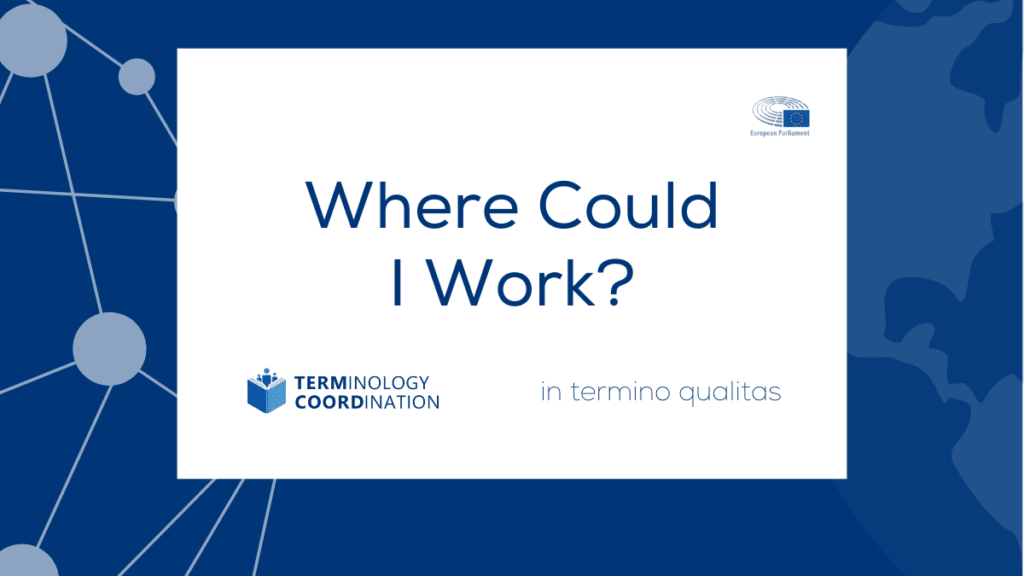
Terminology work is a fundamental step for knowledge transfer in specialised environments and among foreign languages. Indeed, as international cooperation and standardisation efforts in various fields increase, the need for terminologists rises. Terminologists can work in national and international organisations, such as the European Union (EU). In many cases, terminologists must have excellent translation skills to pair with their competences in terminology research and management. More information on the skills that a terminologist should have can be found in our article on The Professional Terminologist’s Profile.
In this article, you will find some information on the national and international bodies in which terminologists can work, and on how to work for the EU as a staff or freelance translator.
National and international bodies where terminologists can work
- European Parliament, Directorate-General for Translation
- European Commission, Directorate-General for Translation
- Council of the European Union
- Translation Centre for the Bodies of the European Union
- Court of Justice of the European Union
- European Central Bank
- European Investment Bank
- United Nations (UN), Terminology Unit
- United Nations Educational, Scientific and Cultural Organization (UNESCO), Translation Operations Unit
- World Meteorological Organization (WMO), Language, Conference and Publishing Services Department
- North Atlantic Treaty Organization (NATO), Terminology Office
- World Intellectual Property Organization (WIPO), Terminology Unit
- Travaux publics et Services gouvernementaux Canada, Bureau de la traduction
- Chancellerie fédérale (Switzerland), Services linguistiques centraux
- Ministère de la culture et de la communication (France), Délégation générale à la langue française et aux langues de France
- American Medical Association (AMA)
- FIFA (Fédération Internationale de Football Association)
Working for the EU as an official
How?
The recruitment process for most European Union institutions is done through an open competition organised by the European Personnel Selection Office (EPSO). The only way to take part in a competition is to apply electronically via the EPSO website.
For jobs at the European Central Bank and the Translation Centre, check their specific websites, as they have their own recruitment procedures.
Open competitions for translators are usually published every year in June or July for linguists and at different times of the year for translators at the Court of Justice (lawyer-linguists). The target languages required vary according to the needs. The aim of the competition is to create a reserve list for the recruitment of permanent officials.
How is a recruitment competition organised?
Open competitions generally consist of preselection tests with multiple-choice questions to test verbal, abstract and numerical reasoning skills, together with linguistic competence. This is followed by a comprehensive assessment focussed largely on translation skills and general competencies. The whole procedure takes five to nine months on average. As the selection procedure may be subject to changes, always check the EPSO website and relevant competition notices for the most recent details.
What are the main languages needed?
The target languages needed are all the official EU languages: Bulgarian, Croatian, Czech, Danish, Dutch, English, Estonian, Finnish, French, German, Greek, Hungarian, Irish, Italian, Latvian, Lithuanian, Maltese, Polish, Portuguese, Romanian, Slovak, Slovenian, Spanish, Swedish – mainly in combination with English, French or German.
Can I take part in these competitions?
Yes, provided:
- you are a citizen of a Member State of the EU or of an acceding State;
- you have perfect command of the target language (usually your mother tongue) and a thorough knowledge of at least two other official EU languages, of which at least one must be English, French or German;
- you must have a university degree, not necessarily in languages (for lawyer-linguist competitions, you must hold a suitable legal education qualification from a Member State).
No professional experience is generally required.
How am I recruited from the reserve list?
Based on the requirements of the EU institutions and the budgetary resources available, successful candidates may be invited to an interview for possible recruitment. The reserve list is valid for a specific period, which can be extended if necessary.
Where can I find further details?
- EPSO
- European Parliament (Luxembourg)
- Council of the European Union/European Council (Brussels)
- European Commission (Brussels and Luxembourg)
- Court of Justice of the European Union (Luxembourg)
- European Court of Auditors (Luxembourg)
- European Economic and Social Committee (Brussels)
- Committee of the Regions (Brussels)
- European Central Bank (Frankfurt am Main)
- Translation Centre for the bodies of the European Union (Luxembourg)
Working for the EU as a freelance translator
Do the EU institutions work with freelance translators?
Yes, apart from the General Secretariat of the Council of the European Union and of the European Council – these two institutions rely (with a few exceptions) on their in-house translating staff.
Currently, more than one quarter of all translations are outsourced. Except for certain particularly sensitive, confidential or urgent texts, freelancers, who are expected to deliver translations of impeccable quality, can translate any EU document.
How can I become a freelance translator for the EU?
Freelance translators and translation agencies, whether they are based in the EU or not, can respond to calls for tenders.
What are the main languages needed?
The main languages needed are all the official EU languages, especially in combination with English, French or German. Other languages, such as Arabic, Chinese or Russian, account for less than 1% of the pages translated by freelancers.
